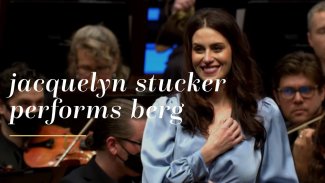

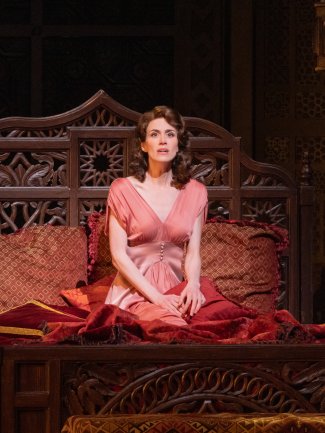

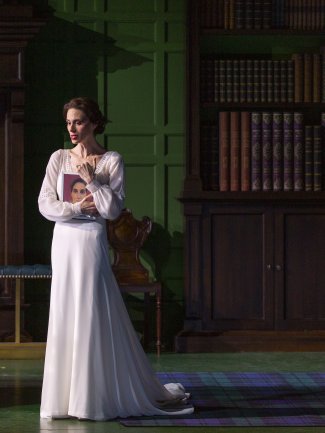
Jacquelyn Stucker
“…but for sheer sensual beauty of voice, the star of the show was the American soprano Jacquelyn Stucker.”
- The Telegraph
Hailed as one of today’s most exciting singing actresses, American soprano Jacquelyn Stucker’s unanimously acclaimed debut as the title role in Ted Huffman’s inspired staging of Monteverdi’s L’incoronazione di Poppea at Festival d’Aix-en-Provence firmly sealed her reputation as a fast-rising star. Her mastery of a broad range of repertoire from classical to contemporary roles has been especially evident in recent seasons where she’s made her debut at The Metropolitan Opera as Contessa (Le nozze di Figaro) under Joana Mallwitz, her role debut as The Governess (The Turn of the Screw) at Santa Fe Opera conducted by Gemma New, and her company and role debut at Opéra national de Paris as Lucia de Nobile in Thomas Adès’ The Exterminating Angel.
Jacquelyn Stucker’s 2025/2026 season is no less impressive, appearing as Gineva in two new productions of Ariodante, at Opéra National de Paris under Raphaël Pichon and directed by Robert Carsen and for The Royal Ballet & Opera under Stefano Montanari and directed by Jetske Mijnssen. She’ll also appear as Fiordiligi (Così fan tutte) under Enrique Mazzola at Lyric Opera of Chicago, return to The Metropolitan Opera as The Bride in the American premiere of Kaija Saariaho’s Innocence under Susanna Mälkki and close the season in Philip Venables’ We Are the Lucky Ones, directed by Ted Huffman, at Tiroler Festspiele Erl with Stucker reprising her starring role of Two under Bassem Akiki.
See More
A graduate of the Jette Parker Young Artist Programme at The Royal Ballet & Opera, Jacquelyn Stucker made her first appearances with the company as Henze’s Aphrodite (Phaedra), as Frasquita (Carmen) in Barrie Kosky’s production, broadcast worldwide as part of the ROH Live Cinema Season, and as Handel’s Alessandro (Berenice), all building to her guest artist debut as Pamina (Die Zauberflöte) under Maxim Emelyanychev in the 2022/23 season.
Other performance highlights include Gretel (Hänsel und Gretel), Freia (Das Rheingold) and Tytania (A Midsummer Night’s Dream) while a member of the ensemble of Deutsche Oper Berlin, Rosalinde (Die Fledermaus) at Staatsoper Hamburg as well as on tour with Les Musiciens du Louvre at Teatro Real Madrid and Théâtre des Champs-Élysées and she sang Eurydice in an innovative production of Orphée et Eurydice with Ensemble Pygmalion conducted by Raphaël Pichon. Jacquelyn Stucker debuted at Glyndebourne Festival as Armida (Rinaldo), sang Zabelle in George Benjamin’s Picture A Day Like This at Linbury Theatre, Royal Ballet & Opera and returned to Festival d’Aix-en-Provence as Dalila in Rameau’s Samson in a new conception by Claus Guth and Raphaël Pichon.
A refined concert artist, Stucker has appeared with leading orchestras and conductors worldwide with highlights including Berg’s Sieben frühe Lieder with Sir Donald Runnicles and the Minnesota Orchestra, Beethoven’s Missa Solemnis with Klaus Mäkelä and the Oslo Philharmonic, Brahms’ Ein deutsches Requiem with Finnegan Downie Dear at Tokyo Spring Festival, and Handel’s Samson with the Academy of Ancient Music, marking her BBC Proms debut.
Jacquelyn Stucker holds a Doctorate in Musical Arts from the New England Conservatory, and a Master’s of Music in Vocal Arts from Bard College.
Contacts
Shirley Thomson Senior Director, VOICE at HarrisonParrott | Head of CSR Phaedra Mylona Artist Coordinator / Administrator
Phaedra Mylona Artist Coordinator / Administrator
General Management
Gallery

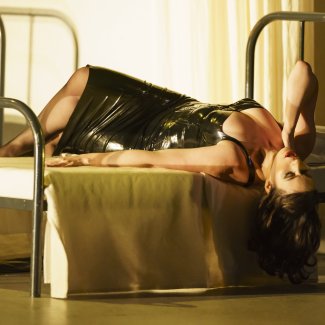

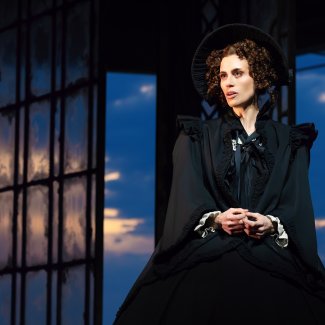

“As played and superbly sung by Jacquelyn Stucker, the Governess was a quirky character, neurotic and with probably quite a backstory. Singing with verbal clarity, Stucker supplied both warmth and a disturbing demeanour.”
“Jacquelyn Stucker, dressed and undressed to kill, in a laudably eloquent, sonorous first foray into Rameau.”
“Pichon has chosen many exquisite pieces of music, which he conducts with a mixture of high drama and sensitivity. The singers perform with profound commitment: Jacquelyn Stucker manages ravishing musicality and glassy precision as Dalila; Lea Desandre sounds curiously unsettled in the part of first wife Timna, while Nahuel di Pierro is suitably threatening as Philistine ruler Achisch. The choir and orchestra of Pygmalion are, as always, vertiginously good.”
“The exceptional Jacquelyn Stucker as Dalila, a fragile and enchanting idol, comes to life with unparalleled performance. Her duet with a flute from the orchestra will remain one of the most beautiful moments of the evening”
“Jacquelyn Stucker sang the hostess Lucía de Nobile with lyrical perfection and bodily presence in her extramarital affairs. The soprano, gifted with a lyrical voice, managed to make the role something distinguished.”
“Most striking is Jacquelyn Stucker as Lucía de Nobile. Her powerful, round voice, with a particularly dense timbre, and precision of singing accompany the interpretation without exhausting the character she portrays.”
“Soprano Jacquelyn Stucker with clear and beautiful phrasing and superlative virtuosity.”
“American soprano Jacquelyn Stucker, as Rosalinde, had the most memorable voice, a distinct beautiful timbre, and a rich creamy middle.”
“Jacquelyn Stucker’s gleaming soprano was worth the wait.”
“The weight of the performance undoubtedly falls on the interpreter of Poppea; on this occasion the American soprano Jacquelyn Stucker is truly extraordinary and without a doubt a singer to follow closely. You rarely see someone live a role with that intensity and truth. In her Poppea there was intention, exquisiteness, dedication… a splendid creation, lived in body and soul. Vocally she is impeccable, resolving the entire part with overwhelming ease.”
“Jacquelyn Stucker’s beautiful Poppea stood out, with singing and stage presence that make her the ideal interpreter of such a rich character.”
“Jacquelyn Stucker illuminated the darkness as Pamina: distilling strength from sweetness and (in that transcendent moment just before the final Trials) reducing me to a tearful, choked-up mess.”
“The cast was headed by Jacquelyn Stucker, a strikingly beautiful woman who imbued her music with a smouldering soprano tone.”
“Stucker possesses a wonderfully expressive voice, with an interesting, colorful pallet which she used intelligently to imbue her voice with an alluring sensuality quality. Her phrasing was detailed and carefully moulded to fit the text, and displayed her fine technique to good effect. She projects her voice sensitively and clearly.”
“Jacquelyn Stucker was a thrilling soloist. She has a full-sounding voice, evenly matched from the bottom of her range to the radiant high notes that Strauss requires. She had the stamina to carry the long lines through, pouring waves of beautiful legato lines.”
“Jacquelyn Stucker who, as a fire-and-brimstone Armida, topped the vocal honours and commanded the dramatic stage. Stucker sang with a sparkle like the luxurious shine of rubies as Armida stamped and scorched her way through any obstacle that dared to confront her. Stucker’s soprano evinced a glamorous intensity with a real glint of danger. It had both bite at the top and succulence in the middle, as well as darkness at the bottom: it’s hard to imagine a soprano with the power and range more suited to embody the evil enchantress’.”
“Stucker scorched the auditorium with Armida’s second act showstopper “Ah, crudel”, her resolute soprano tinted a rich shade of spinto for the whip-cracking dominatrix.”
“but for sheer sensual beauty of voice, the star of the show was the American soprano Jacquelyn Stucker – one of the Royal Opera’s exceptionally strong current crop of apprentices and clearly a name to remember.”
“Jacquelyn Stucker’s Alessandro took the crown for pure vocal beauty, with top notes that exuded warmth as well as clarity and balanced phrasing.”


